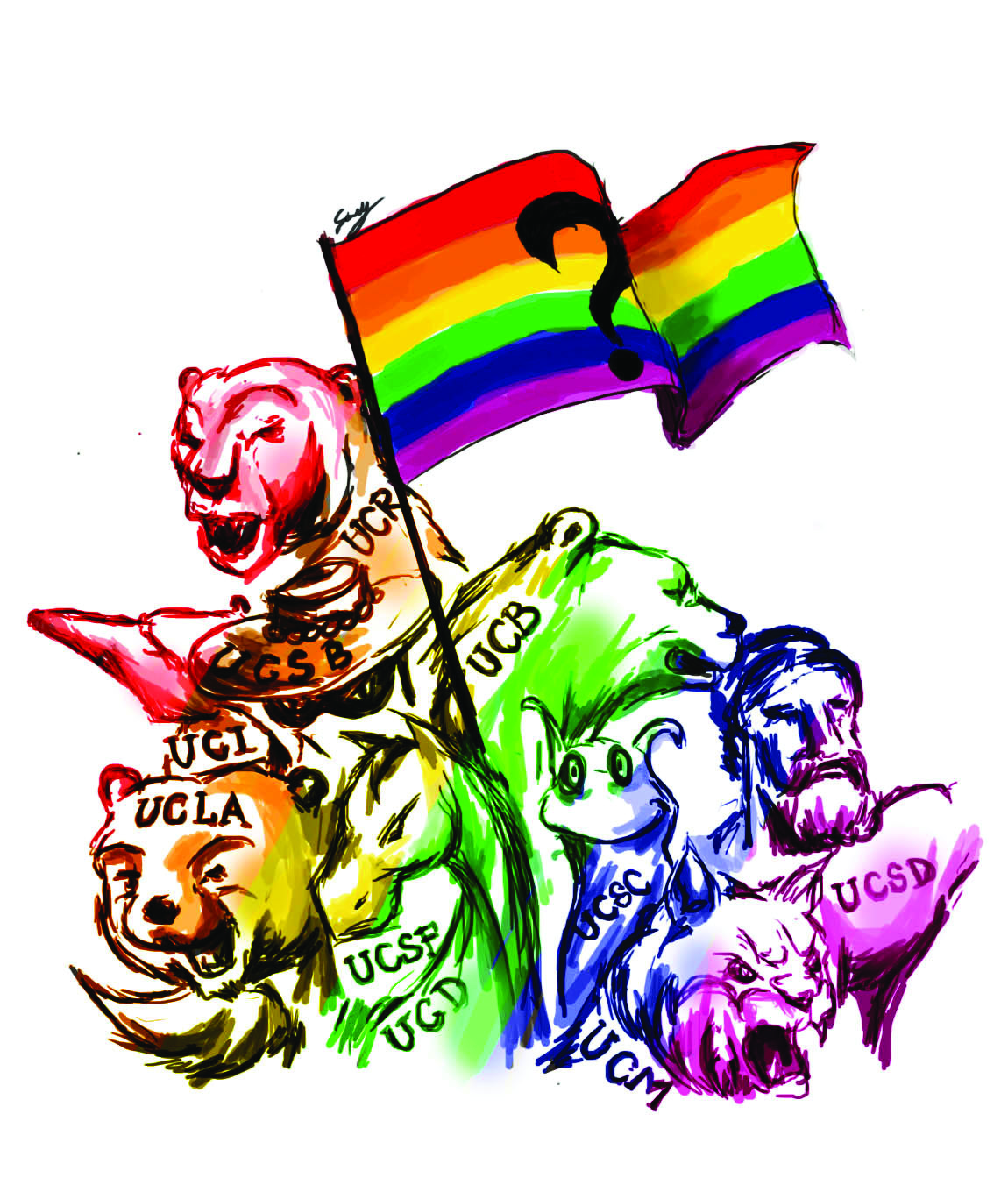UC LGBT task force should prioritize research before taking action

By Nicole Mirea
July 1, 2012 10:47 p.m.


It shouldn’t matter who you love or how you identify your gender ““ every student has the right to feel respected on campus.
But according to the systemwide UC Undergraduate Experience Survey, only 39 percent of LGBT respondents felt their sexuality was respected within the university community. As a reaction to this finding, the UC Office of the President has created a task force to boost LGBT inclusiveness within the UC system.
The 20-person task force includes students, professors and administrators (including two LGBT resource center directors) from all 10 UC campuses, as well as outside experts from the National Center for Lesbian Rights, BiNet USA and the San Francisco Human Rights Commission.
Given that task force meetings, which will begin this July, incur almost no costs, this response seems like an efficient way to create a more inclusive UC.
Of course, all this depends on what the task force will actually do. Before taking any action, it must figure out exactly why LGBT students feel their sexuality is disrespected.
There has been no targeted data collected about the LGBT community yet ““ at least not on the UCLA campus, said Raja Bhattar, director of the UCLA LGBT resource center.
In order to address the needs of each UC, which may range in topic and scope, the task force should first focus on obtaining more reliable and comprehensive data on the LGBT population at the campus level before its members make any other decisions (or worse, assumptions) about the students they are trying to help.
“If we don’t really know who our community is, then how can we provide the best programming and the best services available?” Bhattar said.
Justin Sedor, former editor in chief of UCLA’s OutWrite newsmagazine and recent graduate, identified education about transgender individuals as an area the task force should tackle at UCLA.
“A lot of people don’t know what the (transgender) experience is, and so they say a lot of ignorant stuff,” Sedor said.
Even though the check box giving students the option to identify as LGBT on UCLA’s Statement of Intent to Register this year marks a step in the right direction, a closer look is needed to identify the main concerns of the LGBT community.
Campuses could implement a yearly, and anonymous, undergraduate survey with in-depth questions about gender and sexuality to examine the role of those dimensions in students’ lives.
However, it would appear the task force has a publicity challenge ahead here, since the UC Undergraduate Experience Survey, which is currently the only systemwide survey that collects information about sexual orientation and gender identity, had a response rate of 39.2 percent.
In-person interviews, which could be conducted through each campus’s LGBT center, may also shed more light on the situation.
Next ““ but only after extensive research and data-gathering ““ the task force should develop a concrete set of standards that all its campuses should have to comply with by a certain date. This will ensure students are treated fairly no matter what campus they are on, since right now, the problem of LGBT inclusiveness is handled differently at each school.
The University of California has a single diversity statement (which, by the way, includes gender identity and sexual orientation) ““ why shouldn’t it have a consistent, LGBT-inclusiveness policy from campus to campus?
“To the regents and to the state we are one university, and we’re offering this kind of supportive environment to all the people who work and study at the university,” said Ralph Hexter, co-chair of the task force and Executive Vice Chancellor at UC Davis.
For example, because of space and financial concerns, UC Merced is the only university that does not have an LGBT center. However, Merced’s Assistant Vice Chancellor for Student Affairs Charles Nies said he does not necessarily see the absence as a drawback.
“(LGBT inclusiveness) is not just one center’s responsibility, it’s the entire campus’ responsibility,” Nies said. “I think that’s the way it should be on every campus.”
It’s true that inclusiveness should be practiced throughout the campus, but an LGBT center has its benefits.
A resource center is a place students can go in times of crisis. It serves as a home base, providing special counseling and other services for LGBT students, as well as coordinating events that celebrate the LGBT community and (hopefully, soon) offer information about that community. One of the task force’s standards should be the establishment of centers across the system.
UCLA and UC Merced’s different approaches represent an important reality of the task force’s job: Not all the universities are on the same page when it comes to policies on LGBT inclusiveness.
But this discrepancy could be a blessing in disguise, as different attitudes spark discussions that should ultimately result in complementary policies.
All told, the task force seems to be a good avenue for achieving a standardization of UC LGBT policy and campus community activities. However, its members must first conduct more research to ensure they stay in touch with the actual needs and concerns of the LGBT community.
Email Mirea at [email protected]. Send general comments to [email protected] or tweet us @DBOpinion.

